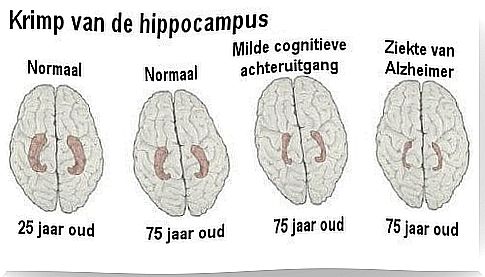Recognize The Early Signs Of Alzheimer’s

Alzheimer’s is a progressive brain disease that directly affects memory, as well as thinking and behavior. Do you know what the signs of Alzheimer’s are?
It is the most common form of dementia and is characterized by memory loss and loss of intellectual capacity. This has a significant impact on the quality of life of the person diagnosed with it.
The disease accounts for 60-80% of all dementia cases worldwide. In the Netherlands alone, approximately 200,000 people have been diagnosed with Alzheimer’s. It is estimated that around the year 2030 there will be more than 400,000 Alzheimer’s patients in the Netherlands.
Although in general the elderly are more likely to be confronted with this disease, the disease can also affect much younger people, who can show symptoms as early as the age of 30.
Learn to recognize the signs of Alzheimer’s
Early recognition of the signs of Alzheimer’s is essential for proper diagnosis and early treatment. That is why it is important to be aware of the possible symptoms of this disease and to learn to distinguish these symptoms from other mental problems.
Sudden changes in memory
One of the early signs of Alzheimer’s, especially in the early stages, is the forgetting of newly acquired information, such as important dates and events.
In general, the affected person will use notes or electronic devices to help themselves remember things that they were previously able to remember.
Difficulty making plans or solving problems

Some people are no longer able to develop a plan or follow a plan that involves dealing with numbers. People with Alzheimer’s may also have trouble keeping track of certain simple things, such as fulfilling a family prescription or paying the monthly bills.
Difficulty performing familiar exercises
Often Alzheimer’s patients experience difficulties in completing their daily tasks, both at home and at work. For example, they may have trouble with:
- Finding a known location.
- To maintain a budget.
- Remembering the rules of a game they have played before.
Disorientation of time and space
As the disease progresses, people begin to forget things like the date, the season, and the passage of time. Attention is required with this symptom, as the person may forget where he/she is and how he/she got there.
Lack of interest in or motivation for previously enjoyed activities

The emotional changes brought about by Alzheimer’s can cause a person to lose interest in things they previously enjoyed. Social isolation and a sudden lack of interest are usually an indication that something is not quite right.
Language problems
One of the signs of Alzheimer’s may be a person experiencing difficulty following or participating in a conversation. This is because the person forgets words and becomes less and less able to understand speech and writing.
It is common for Alzheimer’s patients to have difficulty finding the right words and the appropriate vocabulary. An example is that the person refers to a pen with words like a ‘writing stick’.
Forgetting the place of things
Not being able to remember where things normally are is also an early sign of Alzheimer’s. For example, it can happen that someone with Alzheimer’s puts the iron in the fridge or has forgotten where he/she left something that is always in the same place.
The inability to make decisions

This illness can make a person unable or unable to make important personal decisions, such as financial decisions.
Alzheimer’s patients do not know how to handle money and can, for example, give away a lot of money to a salesperson or telemarketer.
Loss of interest
A lack of interest in familiar activities can be a sign that there is more going on. Alzheimer’s can cause a person to lose interest in enjoying pastimes or getting involved in social activities, projects, or sports.
In addition, these changes can cause a person to lose interest in participating in any kind of activity that involves multiple people.
Changes in mood or personality
Changes in mood or personality are the most recognizable changes in someone with Alzheimer’s, both in the early and advanced stages of the disease.
Alzheimer’s patients are often:
- confused
- suspicious
- depressed
- anxious
- nervous
In addition, they can be irritable and show a lot of angry feelings towards the people around them. So learn to recognize the signs of Alzheimer’s so that you can deal with it better.








